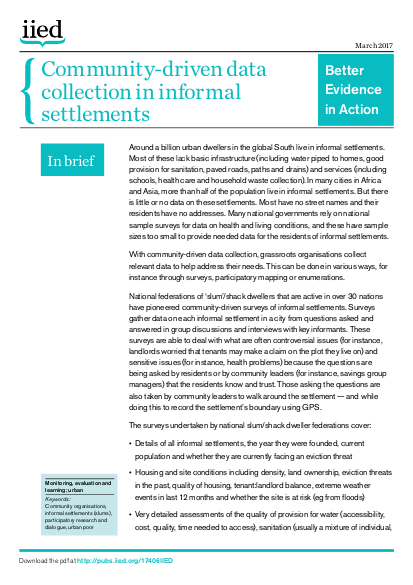
This document is part of the ‘Better Evidence in Action’ toolkit.
Around a billion urban dwellers in the global South live in informal settlements. Most of these lack basic infrastructure (including water piped to homes, good provision for sanitation, paved roads, paths and drains) and services (including schools, health care and household waste collection). In many cities in Africa and Asia, more than half of the population live in informal settlements. But there is little or no data on these settlements. Most have no street names and their residents have no addresses. Many national governments rely on national sample surveys for data on health and living conditions, and these have sample sizes too small to provide needed data for the residents of informal settlements.
With community-driven data collection, grassroots organisations collect relevant data to help address their needs. This can be done in various ways, for instance through surveys, participatory mapping or enumerations.
Links
Resource collections
- Evaluating humanitarian action
- Monitoring and Evaluation (M&E)
- Monitoring of humanitarian action
- UN Habitat - Urban Response Collection
- Urban Response - Urban Crisis Preparedness and Risk Reduction
- Urban Response Collection - Community Engagement and Social Cohesion
- Urban Response Collection - Economic Recovery
- Urban Response Collection - Environment and Climate Change
- Urban Response Collection - Housing, Land and Property
- Urban Response Collection - Urban Crisis Response, Recovery and Reconstruction
- Urban Response Collection - Urban Resilience
- Use of evaluation evidence
